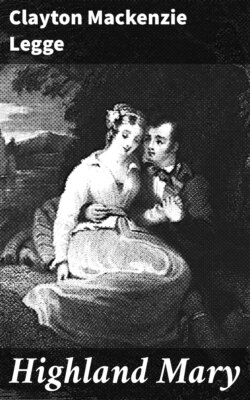Читать книгу Highland Mary - Clayton Mackenzie Legge - Страница 8
На сайте Литреса книга снята с продажи.
CHAPTER IV
ОглавлениеTable of Contents
“Ah, Souter Johnny, how are ye, mon?” cried Robert heartily, as his eyes rested on the beaming face of the old man. “Faith, an’ I thought I’d find ye here as of old. ’Tis almost a fixture ye are.”
“Ah, weel,” replied Souter nonchalantly, as he shook Robert’s outstretched hand, “ye ken the Scripture says, ‘an’ the poor ye have always wi’ ye.’” Robert laughed merrily at the old man’s sally.
“Thank goodness, they’ve gone at last,” said Mrs. Burns with a sigh of relief, as she entered the room. “Why, laddie, ye had half the ne’er-do-weels of Mossgiel a-following ye. They are only a lot of leeches and idle brawlers, that’s a’,” and her dark eyes flashed her disapproval.
“I’m sure they have kind hearts, mither, for a’ that,” replied Robert reproachfully.
“Ye’re so popular wi’ them a’, Robbie,” cried Souter proudly.
“Aye, when he has a shillin’ to spend on them,” added Mrs. Burns dryly. “But sit doon, laddie; ye maun be tired wi’ your lang walk,” and she gently pushed him into a chair beside the table.
“I am a wee bittie tired,” sighed Robert gratefully as he leaned back in the chair.
“I’ll soon hae something to eat before ye,” replied his mother briskly.
“I’m nae hungry, mother,” answered Robert. “Indeed, I couldna’ eat a thing,” he remonstrated as she piled the food before him.
“’Tis in love ye are,” insinuated Souter with a knowing look. “I ken the symptoms weel; ye canna’ eat.”
“Ye’re wrong there,” replied Robert with a bright smile. “Love but increases my appetite.”
“Aye, for love,” added Souter sotto voce.
“Ah, mother dear, how guid it seems to be at hame again, under the old familiar roof-tree,” said Robert a little later, as he leaned back contentedly in his chair and gazed about the room with eager, alert glances. As he sits there with his arms folded let us take a look at our hero. Of more than medium height, his form suggested agility as well as strength. His high forehead, shaded with black curling hair tied at the neck, indicated extensive capacity. His eyes were large, dark, and full of fire and intelligence. His face was well formed and uncommonly interesting and expressive, although at the first glance his features had a certain air of coarseness, mingled with an expression of calm thoughtfulness, approaching melancholy. He was dressed carelessly in a blue homespun long coat, belted at the waist, over a buff-colored vest; short blue pantaloons, tucked into long gray home-knit stockings, which came up above his knee, and broad low brogans, made by Souter’s hands. He wore a handsome plaid of small white and black checks over one shoulder, the ends being brought together under the opposite arm and tied loosely behind.
“’Tis a fine hame-comin’ ye’ve had, laddie,” cried old Souter proudly. “Faith, it’s just like they give the heir of grand estates. We should hae had a big bonfire burnin’ outside our—ahem—palace gates,” and he waved his hand grandiloquently.
“Dinna’ ye make fun of our poor clay biggin’, Souter Johnny,” cried Mrs. Burns rebukingly. “Be it ever so poor, ’tis our hame.”
“Aye, ’tis our hame, mother,” repeated Robert lovingly. “An’ e’en tho’ I have been roaming in other parts, still this humble cottage is the dearest spot on earth to me. I love it all, every stick and stone, each blade of grass, every familiar object that greeted my eager gaze as I crossed the moor to this haven of rest, my hame. And my love for it this moment is the strongest feeling within me.”
His roving eyes tenderly sought out one by one the familiar bits of furniture around the room, and lingered for a moment lovingly on the old fireplace. It was there he had first seen Mary Campbell. She had come to the cottage on an errand, and as she stood leaning against the mantel, the sunlight gleaming through the window upon her golden hair, he had entered the room. It was plainly love at first sight, and so he had told her that same day, as he walked back to Castle Montgomery with the winsome dairymaid. The course of their love had flowed smoothly and uneventfully; he loved her with all the depth of his passionate emotional nature, and yet his love was more spiritual than physical. She was an endless source of inspiration, as many a little song and ode which had appeared in the Tarbolton weekly from time to time could testify. How long the year had been away from her, he mused dreamily. To-morrow, bright and early, he would hurry over to Castle Montgomery and surprise her at her duties.
